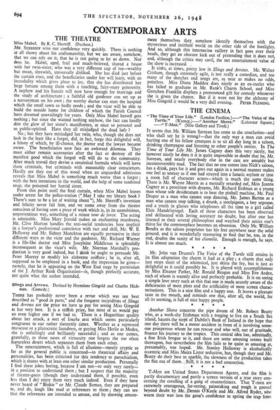CONTEMPORARY ARTS
THE THEATRE
Miss Mabel. By R. C. Sherriff. (Duchess.) MR. SHERRIFF wins our confidence very quickly. There is nothing at all showy about his craftsmanship, but we are aware, somehow, that we can rely on it, that he is not going to let us down. Nor does he. Mabel, aged, frail and much-beloved, shared a house with her twin-sister, who was a very different cup of tea—wealthy but mean, shrewish, universally disliked. She has died just before the curtain rises, and the beneficiaries under her will learn, with an incredulity which gives place to joy, that she has distributed her large fortune among them with a touching, fairy-story generosity. A nephew and his fiancée will now have enough for marriage and the study of architecture ; a faithful old gardener can set up as a nurseryman on his own • the worthy doctor can start the hospital which the small town so badly needs ; and the vicar will be able to build the seaside home for children of which the Parish Council have dreamed unavailingly for years. Only Miss Mabel herself gets nothing ; but since she wanted nothing anyhow, the fact can hardly dim the glow of her sister's munificence, at once so personal and so public-spirited. Have they all "misjudged the dead lady ?
No; but they have misjudged her twin, who, though she does not look in the least like a forger, did, in fact, forge this delightful will, a felony of which, by ill-chance, the doctor and the lawyer become aware. The beneficiaries now face an awkward dilemma. They must either remain accessories after the fact or destroy all the manifest good which the forged will will do to the community. After much travail they devise a casuistical formula which will leave them criminals, but criminals with reasonably clear consciences. Hardly are they out of this wood when an unguarded admission reveals that Miss Mabel is something much worse than a forger ; with the best intentions in the world, and the help of some toadstool soup, she poisoned her horrid sister.
From this point until the final curtain, when Miss Mabel leaves under arrest for the police-station ("May I take my library book ? There's sure to be a lot of waiting about "), Mr. Sherriff's invention and felicity never fail him, and we come away from the theatre conscious of having seen a piece of work which is, in its unambitious, unpretentious way, something of a minor tour de force. The acting is admirable. Miss Mary Jerrold makes an enchanting murderess, Mr. Clive Morton handles the anti-social tendencies here implicit in a lawyer's professional conscience with tact and skill, Mr. W. E. Holloway and Mr. Sidney Monckton are equally persuasive in their different ways as the vicar and the gardener, Mr. Richard Warner is a life-like doctor and Miss Josephine Middleton is splendidly inconsequent as the vicar's wife. Mr. Norman Marshall's pro- duction is very good indeed, but I *ink he ought to persuade Mr. Peter Murray to modify his elabOrate coiffure ; he is, after all, supposed to be employed in a bank, and the impression he gives— namely, that he is appearing on the West End stage by permission of the J. Arthur Rank Organisation—is, though perfectly accurate, not quite what the author intended.




































 Previous page
Previous page